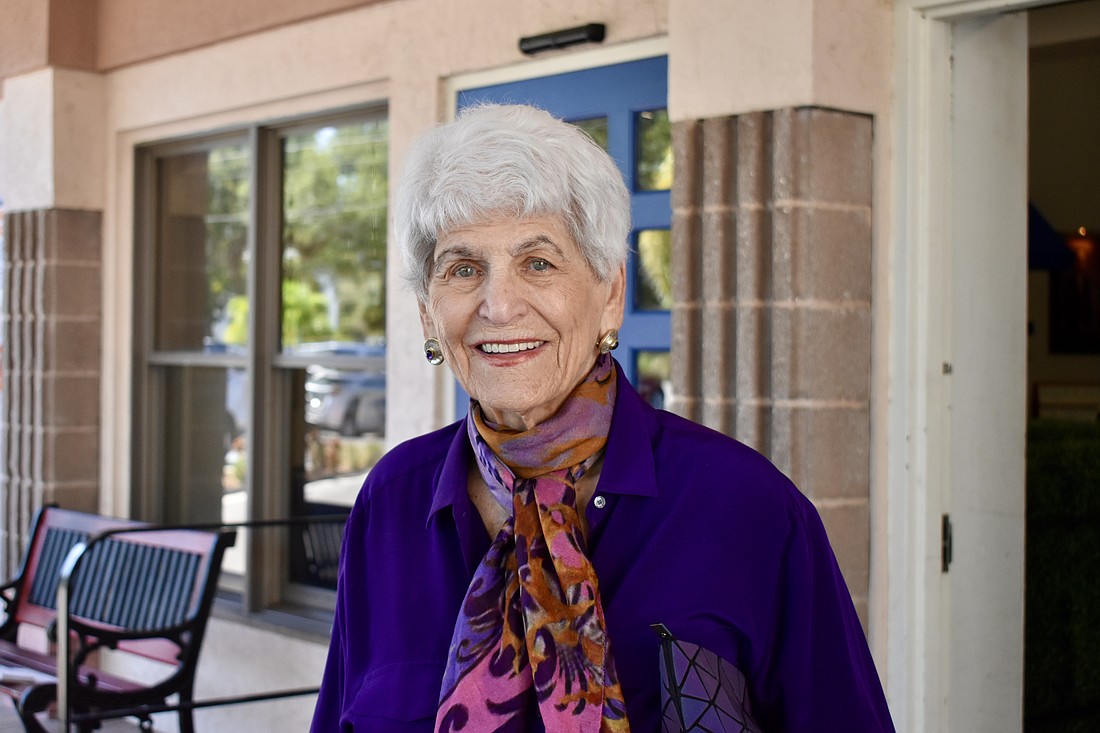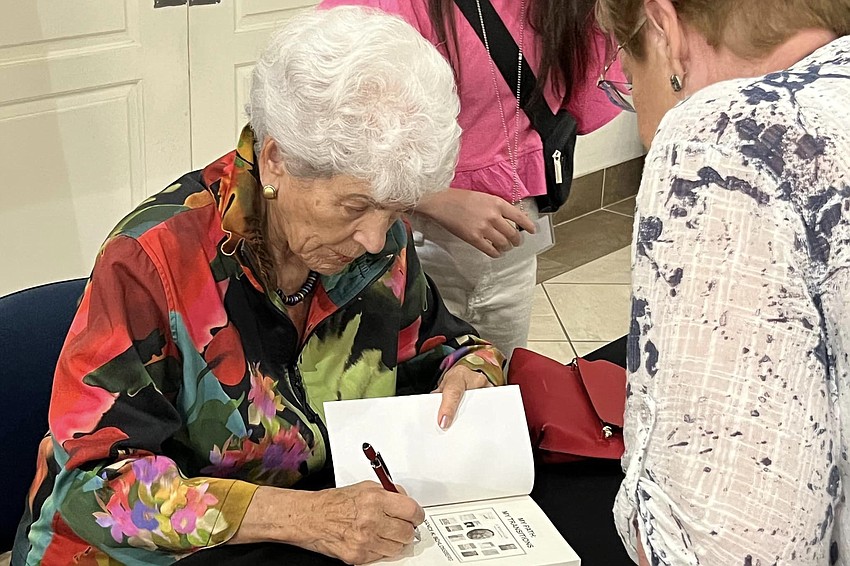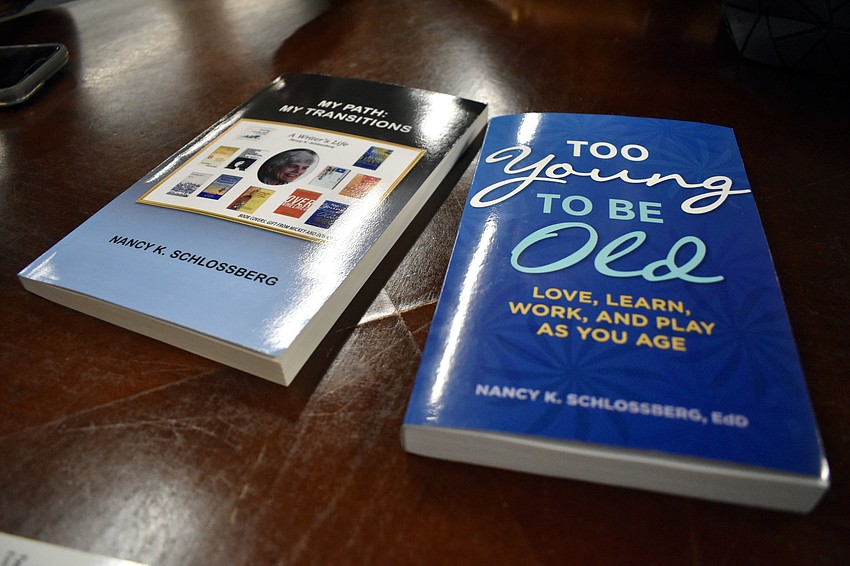- April 1, 2025
-
-
Loading

Loading
 Photo by Ian Swaby
Photo by Ian Swaby
When Nancy Schlossberg began thinking about entering a retirement community 10 years ago, her son Mark Schlossberg told her she was too young.
But Schlossberg, 94, a professor emerita of counseling psychology at the University of Maryland and author of multiple self-help books, said she knew very well that people ought to do things before they need to.
Today, as a resident of the retirement community Sarasota Bay Club, she leads a life that involves speaking engagements, co-hosting a discussion group at Senior Friendship Centers and even the publication of a new book, "My Path, My Transitions," as recently as May 2023.
“I’m very busy, I live in a wonderful community, I have a very active social life, and I have two wonderful adult children,” she said.

Although Nancy Schlossberg’s research and books have often focused on old age, she said she likes to think she has something for all ages.
Life transitions affect everyone and have defined her own path, including her time as a young Barnard College student struggling to find her calling.
When she graduated and served as director of admissions for a fashion school, Tobé-Coburn School, the search didn’t end. Julia Coburn, the school’s director, was perplexed that while Schlossberg was skilled at her job, she didn’t enroll enough students. This, said Schlossberg, was because she tried to help students understand what they wanted, not recruit them.
Yet she was onto something – an interest in understanding and helping others.
The pieces all came together as she pursued a doctorate in counseling psychology at Columbia University, reading works by sociologist Robert Merton and psychologist Bernice Neugarten.
Schlossberg found herself intrigued by Neugarten’s ideas, such as the theory that much of people’s well-being in their later years is determined by their social clock, which involves the social norms of how people behave.
Thus, she discovered her true passion, adult development.
That's not to say that life was suddenly free of change. In 1963, after she married attorney Stephen Schlossberg, with whom she remained until his death in 2011, she gained the responsibility of two children.
When Stephen found the job of a lifetime, as an attorney for labor leader and civil rights activist Walter Reuther in Detroit that meant Nancy couldn’t carry out her dream to study with Neugarten at the University of Chicago.
Instead, she organized a conference to bring Neugarten to Wayne State University, where she was then serving, while continuing to explore her field.
Of course, she could also depend on Stephen Schlossberg for support, with him there to remind her that she could not give up, despite her many responsibilities.
“I've never had anybody in my life who believed in me the way he did,” she said.
She went on to work for almost 28 years at the University of Maryland as a professor of counseling psychology, during which time she created Schlossberg's Transition Theory, which details the factors impacting life transitions.
“The principles are the same, whatever age you are at,” she said.
Now as a retiree, she chooses to focus on all the things she has to appreciate – not on what she may have lost.
“I’m a good speaker, but I'm not as good as I was 20 years ago,” she said. “I was terrific; I don't focus on that. I think it's amazing that I can still speak.”
Today, her life involves co-hosting the group Aging Rebels at Senior Friendship Centers with retired lawyer Mike Karp; working remotely with the nonresident committee of the Cosmos Club in Washington, D.C., for which she serves as chair; offering speaking engagements for nonprofits and other organizations, and enjoying life in Sarasota alongside her partner Richard Olin.
The Aging Rebels fills a need she said is essential for seniors: a solid net of support. While she is grateful to find such a net in her children, Mark and Karen Schlossberg, not everyone can be so fortunate, she said.
“That’s why people come here,” she said of the group. “Whether they have it at home or not, they get it here. They make friends here.”
Even though she's highly qualified to promote the possibilities in life, she knows it isn't perfect.
“First of all, I’m 94, so you do spend a lot of time running from doctor to doctor, and it becomes a part-time job,” she said.
She said when people encounter immense challenges, like the loss of the spouse or a child, there is often no easy solution. With events like these, she said people must assess their situation, examine their “self” and choose to be an optimist, ensure they have a network of support, and find strategies for coping. They also must understand that transitions are impermanent.
“The day your spouse dies, the day your job is eliminated, is not the way you're going to feel six months later, or two years later,” she said.
“Stay open, go to someplace like the Senior Friendship Center, go listen to jazz, go to the discussion groups, look for new paths, don’t say I’m too old – you’re not too old…” she advises. “It's not over till it's over, and you can spend your life closing up, or staying open.”
Staying intellectually stimulated is always important, she said.

“I’m not a TV watcher,” she said. “I used to watch the news. I can’t watch the news anymore… If I’m free, I’m not going to turn on the television.” However, she has enjoyed watching shows on Netflix with Olin which she called “really wonderful,” including the Korean shows “Extraordinary Attorney Woo” and “Crash Landing on You.”
Helping others is also essential to happiness, she finds. For her, a major way of helping has been her life’s calling of studying and teaching others about adult development. In May 2023, she published a memoir, “My Path: My Transitions,” with a book launch being hosted at Senior Friendship Centers.
Every week, she said, she receives emails from people she has never met, describing how her writings have helped them.
“I just have been so fortunate to have something that has been important to me, and that I’ve had the opportunity to work on it all these years,” she said.